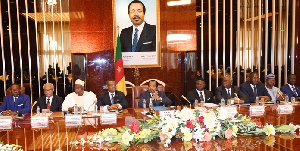Earlier today, Yefon Mainsah posted the following challenge on Facebook: “what is "Business", "Market" in your dialect? If you are multilingual..just tok all...lol State the dialect and division. Thanks".
MY RESPONSE
Regarding Ngamambo (Mbu-Baforchu language), "Market" is "ywini" and "business" is also "ywini". What distinguishes them is the context. To "go to the market" for instance is "ghe ywini". But to "do business" is "tang ywini" which word for word means "to count (the ) market".
If I`m not wrong, "profit" is "njim kab", an expression which when broken down stands for "the back (of)" for "njim"; and "kab" for "money".
So, an expression such as "Me ke ghe ywini tang ywini njim kab redjuei." would mean "I went to the market, did business but the profit did not come out", which could be paraphrased as "it did not yield profit". But perhaps again, "njim kab" is "the capital outlay" that one invests in a business.
The word "market" in Ngamambo (the Mbu-Baforchu language) and Lamnso (the Nso language): An exercise in comparative linguistics: "Market" and "business" can both be expressed in Ngammambo as "ywini", just as they can also be expressed in Lamnso as "wai".
The two speakers would therefore respectively say "Me du wai" (Lamnso) and "Me ghe ywini" (Ngamambo) to mean "I am going to the market". However, the semantics would change if both were to be asked the question, " what they do in life" in the sense of, to earn a living.
In Lamnso the question is "A yi ka?" and in Ngammabo it is "Afa`a ye?". The answers to that question become more complex than just the straight translation of "market" and "business". So the Lamnso speaker would answer it by saying something like "Me yi wai" ( which can be translated as "I am doing business) but which really means word-for-word "I am making market".
The Ngamambo native speaker would rather say, "Me we tang ywini" (I am doing business) which when rendered word-for-word means "I am counting market".
Lamnso is a language spoken by the Nso clan in Bui Division. In terms of population, it is the language of the majority in Bui Division. Ngamambo is spoken by the villages that have come to be known as Baforchu.
These are Mbu (the mother village), Santa Mbei, Baba II, (in Santa Sub Division); Banjah in Bamenda III Sub Division; Baforkum in Tubah Sub Division (Mezam Division), and Ngyen Mbo , one of the Metta villages in Momo Division.
However, the Ngyenmbo dialect of Metta is very similar to Ngamamambo. Mbu, Santa Mbei, Baba, Banjah and Baforkum, speak dialects that are slightly different, but very similar.
Significantly, people from outside of these linguistic families often think that the Nagamambo they are hearing is either Metta or Batibo. They are not wrong because scientific research has shown that Ngammambo, Moghamo (Batibo) and Menemo (Metta) bear an 88 per cent resemblance to each other!
Opinions of Saturday, 14 February 2015
Auteur: Tikum Azonga















